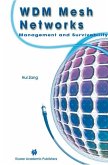In recent years, with the rapid growth of the Internet, the bandwidth demand for data traffic is exploding. Optical networks based on wavelength-division multiplexing (WDM) technology offer the promise to satisfy the bandwidth requirements of the Internet infrastructure. With WDM technology, signals are carried simultaneously on mUltiple wavelengths on a single fiber. WDM provides a practical approach of resolving the mismatch between the fiber ca pacity and the peak electronic processing speed. Mesh-based WDM networks have recently attracted much research and development interest since the In ternet topology is meshed in nature, and more importantly, mesh-based WDM networks are flexible with respect to routing and survivability. This book exam ines the management and survivability issues of mesh-based WDM networks and proposes new WDM network protocols and algorithms that could make telecommunication networks more efficient. Wavelength-routing has been one of the most important technologies to em ploy WDM in backbone networks. In wavelength-routed WDM networks, optical channels, which are referred to as lightpaths, are set up between WDM terminals. Most chapters of this bock are focused on various issues related to wavelength-routed networks, namely, routing and wavelength-assignment, con trol and management, fault management, and wavelength-converter placement. This book also presents an all-optical packet-switched network architecture based on the concept of photonic slot routing. The audience for this book are network designers and planners, research and development engineers active in the field of telecommunications, and students of optical networking at the graduate or senior undergraduate levels.
Hinweis: Dieser Artikel kann nur an eine deutsche Lieferadresse ausgeliefert werden.
Hinweis: Dieser Artikel kann nur an eine deutsche Lieferadresse ausgeliefert werden.








